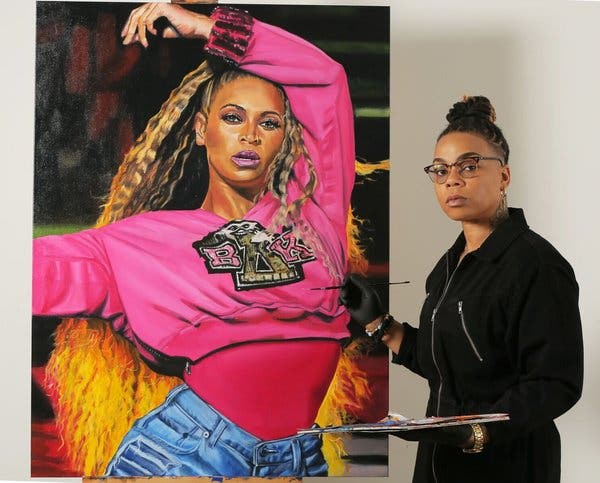Each year, when the month of June rolls around, big brands emerge awash in rainbow colors. There are rainbow-soled Pride sneakers from Puma and reusable rainbow cups courtesy of the world’s largest coffee corporation. Urban Outfitters is selling a line of Pride merchandise, and Snapchat created a special filter for the month. This week, Taylor Swift released a music video filled with Pride flags and a cast of gay, trans and nonbinary celebrities. On Thursday, it had more than 40 million views on YouTube.
Sometimes these shows of corporate solidarity go awry. A few Pride campaigns have been called out for manufacturing apparel in countries where being gay is illegal or where queer people are commonly persecuted. Others are led by companies that have been criticized for their labor practices.
The good news is there are plenty of queer independent artists whose small-batch work can be purchased any month of the year. Here are five of them.
Madam Muse

CreditSham Abdo
Adrienne Muse began drawing professionally in 2012, when a co-worker, impressed by the art in her office, said he’d pay for a portrait of his daughter. In her personal work, she focuses on queer representation, depicting women in their moments of intimacy and leisure. “There is not that much art featuring women of color and even less with queer women of color, and I really want to change that,” Mrs. Muse, 38, said.
She is perhaps best known for her celebrity portraiture; her famous subjects have included Prince, Whitney Houston, Lauryn Hill and Nipsey Hussle, some of whose images she also prints on T-shirts ($45). “I know some artists think that’s commercial, but I understand that a lot of people aren’t financially able to collect original artwork, especially people of color in my community,” she said. “I wanted to give them another way to show their support. I consider anyone who purchases a print or a T-shirt from me a collector.”
Frizz Kid
Hana Shafi, a Toronto-based illustrator and writer, is known for her Instagram affirmations on race and gender: “feminism is freedom from gender violence,” “We deserve more than just survival/ we deserve to thrive,” “even if you can’t tell your story/ I hear you/ I believe you.” These statements appear on printed illustrations and buttons, so her fans who contribute to her Patreon page can incorporate the messages into private and public spaces. “As a queer Muslim woman my identity is inherently politicized, so my art is always going to reflect that,” she said.
Ms. Shafi, 25, sees her art as a means of combating various forms of oppression. “I know that my story is not the only one, so I want to show different marginalized experiences through my work,” she said. “I want to show black trans experiences, Muslim experiences, and have my followers feel compelled to support people with those identities.”
Queer Candle Co.
Ab Gibson and Al Rose’s soy wax candles began from a shared hobby. “Candle making was something we loved doing,” Ms. Gibson, 25, said. “So we decided, instead of buying products to make them, why not do it ourselves?” The candles are infused with herbs like rosemary, sage and mint, grown by the couple in their Washington Heights home.
“Candles are marketed as this luxury item and we wanted to make them available to our friends, family and community,” said Ms. Rose, 23. The candles cost $10 each, and 10 percent of the duo’s monthly proceeds go to the Sylvia Rivera Law Project, a grass-roots organization that focuses on supporting transgender and gender nonconforming youth of color. “We realize that as queer people we also carry a lot of privilege,” Ms. Gibson said. “We are white, we have jobs, and so we wanted to put our money where our mouth is.”
Stuzo Clothing
Uzo Ejikeme, 33, and Stoney Michelli, 37, started the clothing company Stuzo to proudly proclaim that queerness was a valid identity. “In college, an ex-boyfriend of mine asked me if I was still gay,” said Mrs. Michelli. “I remember thinking what type of question is that? After, I knew I wanted to create something which showed that being queer was not a phase. It’s who we are and that’s how the first logo was created.”
Based in L.A., Mrs. Ejikeme and Mrs. Michelli are intentional about representing the purpose of the brand, down to the models hired. “This isn’t just about finding a pretty face and putting clothes on them,” said Mrs. Ejikeme. “They have to be unapologetic about who they are, and they have to invoke our mission statement, which is to live boldly and to live unapologetically.”
Wild Fancy Design
Lex Non Scripta and Voula O created Wild Fancy Design in 2010. “We were interested in making jewelry that supports self-expression and queer self-determination,” Voula O, 40, said. Based in Western Massachusetts, the artists design fun, quirky pieces that play on the malleability of gender or highlight the importance of personal pronouns.
“Extraction of metals is intensive on our planet and we are very mindful of that,” said Lex Non Scripta. The jewelry is made with vintage deadstock materials sourced from warehouses across the country. “It’s not efficient, but it’s worth it,” said Voula O.







